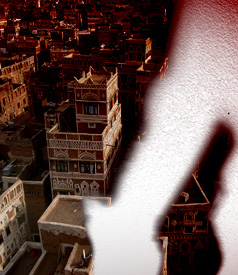Truthout is a vital news source and a living history of political struggle. If you think our work is valuable, support us with a donation of any size.
From a Yemeni perspective, it appears that the West is sending terrorists to Yemen. This week, Sharif Mobley, a 26-year-old from Buena, New Jersey has joined the list of suspected Al Qaeda militants, believed to be bred in the West, and trained in Yemen.
As this list grows larger, it also appears to grow less random. Anwar al-Awlaki, a radical U.S.-born Yemeni cleric, who preaches jihad on the internet is believed to be connected to Mobley.
Al-Awlaki is already accused of encouraging the failed Christmas bomber, Umar Farouk Abdulmutallab, and of inspiring the Fort Hood massacre, which left 13 people in Texas dead. On his blog, al-Awlaki called the alleged shooter, Nidal Hasan, a “hero.”
Mobley has been in Yemeni custody for months, but it wasn’t until he tried to escape by shooting his way out of a Sana’a hospital early this week, that his status as a former nuclear power plant worker, and a currently-suspected Al Qaeda operative became public. The failed escape attempt left one guard dead and another severely injured.
Nate Harper, an American language student, was working at a nearby library when Mobley allegedly opened fire. Harper said he heard about 20 shots.
“I was here when the embassy was attacked,” he said, referring to the 2008 attack on the U.S. Embassy in Yemen that killed 19 people. “I was looking for smoke rising because if it was a car bomb or something like that then maybe it would have explained the large noises.”
According to local reports, Mobley convinced the guards to unshackle him for prayers and then stole the gun while a guard was is in the bathroom. After shooting the guards in his room, Mobley made a run for it, but was caught by hospital staff members.
The Yemeni government originally said Mobley was a German-Somali, accused of plotting terror attacks with Al Qaeda. An investigation in the U.S. found him to be an American, of Somali descent. Friends and family have been defending him in the U.S. press this week. Charles Mobley, his father, told reporters: “I can tell you this: He’s no terrorist.”
Before coming to Yemen, supposedly to study Arabic and Islam, Mobley worked for several different American nuclear power companies as a laborer. The FBI is currently looking to find out if he had access to sensitive information, which he could have passed on to terrorists. In his six years at the East Coast plants, he mostly hauled materials, and set up scaffolding, according to the Associated Press, and passed numerous security screenings.
Yemen has made high-profile efforts to combat terrorism in recent months, but many say the country, largely governed by tribal sheiks with a complex web of loyalties, not the central government, is ill-equipped to fight Al Qaeda. The central government also draws vast sums of international aid, and support in the name of fighting Al Qaeda. In front of Western journalists, government officials insist that crushing terrorism in Yemen is their first priority. But they are also not shy about admitting that they consider the recently-quiet northern rebels, “terrorist gangs.” In the past few weeks, the Yemeni government has also accused southern separatists of siding with Al Qaeda, even as separatist protesters wave British and American flags.
A terrifying moment. We appeal for your support.
In the last weeks, we have witnessed an authoritarian assault on communities in Minnesota and across the nation.
The need for truthful, grassroots reporting is urgent at this cataclysmic historical moment. Yet, Trump-aligned billionaires and other allies have taken over many legacy media outlets — the culmination of a decades-long campaign to place control of the narrative into the hands of the political right.
We refuse to let Trump’s blatant propaganda machine go unchecked. Untethered to corporate ownership or advertisers, Truthout remains fearless in our reporting and our determination to use journalism as a tool for justice.
But we need your help just to fund our basic expenses. Over 80 percent of Truthout’s funding comes from small individual donations from our community of readers, and over a third of our total budget is supported by recurring monthly donors.
Truthout’s fundraiser ended last night, and we fell just short of our goal. But your support still matters immensely. Whether you can make a small monthly donation or a larger one-time gift, Truthout only works with your help.
